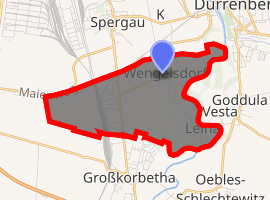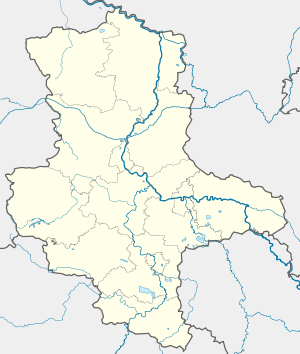Wengelsdorf
Wengelsdorf is a village and a former municipality in the Burgenlandkreis district, in Saxony-Anhalt, Germany. Since 1 September 2010, it has been part of the town Weißenfels.
Wengelsdorf | |
|---|---|
Stadtteil of Weißenfels | |
Location of Wengelsdorf 
| |
 Wengelsdorf  Wengelsdorf | |
| Coordinates: 51°16′56″N 12°2′25″E | |
| Country | Germany |
| State | Saxony-Anhalt |
| District | Burgenlandkreis |
| Town | Weißenfels |
| Government | |
| • Mayor | Sybille Reider, Ortsbürgermeisterin[1] |
| Area | |
| • Total | 5.89 km2 (2.27 sq mi) |
| Elevation | 94 m (308 ft) |
| Population (2009-12-31) | |
| • Total | 905 |
| • Density | 150/km2 (400/sq mi) |
| Time zone | CET/CEST (UTC+1/+2) |
| Postal codes | 06688 |
| Dialling codes | 034446 |
| Vehicle registration | BLK |

Town as seen on approach from Bad Duerrenberg side

Church

Wengelsdorf Manor
Historical Population
(From 1995 as of 31 December):
| Year | Population |
|---|---|
| 1990 | 945 * |
| 1995 | 910 |
| 2000 | 936 |
| 2005 | 917 |
* 3 October
gollark: <@546919893065531393>
gollark: See, if I was the owner/admin *I* wouldn't randomly ping everyone!
gollark: ```python#!/usr/bin/env python3import argparseimport subprocessimport randomimport stringparser = argparse.ArgumentParser(description="Compile a WHY program using WHYJIT.")parser.add_argument("input", help="File containing WHY source code")parser.add_argument("-o", "--output", help="Filename of the output executable to make", default="./a.why")parser.add_argument("-O", "--optimize", help="Optimization level", type=int, default="0")args = parser.parse_args()def randomword(length): letters = string.ascii_lowercase return ''.join(random.choice(letters) for i in range(length))def which(program): proc = subprocess.run(["which", program], stdout=subprocess.PIPE) if proc.returncode == 0: return proc.stdout.replace(b"\n", b"") else: return Nonedef find_C_compiler(): compilers = ["gcc", "clang", "tcc", "cc"] for compiler in compilers: path = which(compiler) if path != None: return pathdef build_output(code, mx): C_code = f"""#define QUITELONG long long intconst QUITELONG max = {mx};int main() {{ volatile QUITELONG i = 0; // disable some "optimizations" that RUIN OUR BEAUTIFUL CODE! while (i < max) {{ i++; }} {code}}} """ heredoc = randomword(100) devnull = "2>/dev/null" shell_script = f"""#!/bin/shTMP1=/tmp/ignore-meTMP2=/tmp/ignore-me-tooTMP3=/tmp/dont-look-here cat << {heredoc} > $TMP1{C_code}{heredoc}sed -e '1,/^exit \$?$/d' "$0" > $TMP3chmod +x $TMP3$TMP3 -x c -o $TMP2 $TMP1chmod +x $TMP2$TMP2exit $?""".encode("utf-8") with open(find_C_compiler(), "rb") as f: return shell_script + f.read()input = args.inputoutput = args.outputwith open(input, "r") as f: contents = f.read() looplen = max(1000, (2 ** -args.optimize) * 1000000000) code = build_output( contents, looplen ) with open(output, "wb") as out: out.write(code)```
gollark: !esowiki WHY
gollark: Yes.
This article is issued from Wikipedia. The text is licensed under Creative Commons - Attribution - Sharealike. Additional terms may apply for the media files.